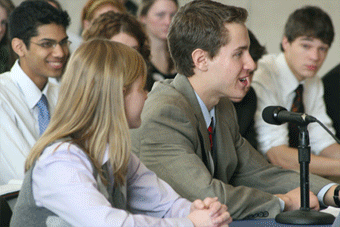
Photos: John Vettese
With their classmates and teachers looking on, Fox Chapel Area High School students Julia L. Hazlet and Luke J. Secosky today urged members of the Pennsylvania House State Government Committee to amend the law to allow 17-year-olds to vote in primary elections if they will be 18 in time for the general election.
“It makes sense that if you are qualified to vote for the president, you should also be qualified to elect your party’s nominee for that position,” Hazlet told the committee, gathered for a special hearing in the National Constitution Center in Philadelphia.
“Eleven other states have enacted legislation similar to House Bill 520, which would amend the state’s election code. Among those states are neighboring Ohio, Maryland, West Virginia and Virginia. “Are Pennsylvania’s 17-year-olds less qualified to vote than 17-year-olds in Ohio?” asked Jennifer L. Klein, a Fox Chapel social studies teacher who joined Hazlet and Secosky at the witness table.
The effort to lower Pennsylvania’s voting age law began as a Student Voices civics project at Fox Chapel, near Pittsburgh. It won first place in the community project category of the Greater Pittsburgh Student Voices fourth annual civics fair.
The Fox Chapel students met with Reps. Frank Dermody of Allegheny County and Richard T. Grucela of Northampton County and urged them to introduce the necessary legislation. Both lawmakers were present at today’s hearing.
“Some of this stuff is dynamite,” Grucela told Hazlet and Secosky after listening to their testimony. He said he plans to use their arguments on behalf of the bill on the House floor – properly crediting the students, he assured them with a smile. Dermody congratulated the Fox Chapel Student Voices participants. “Thanks for opening my eyes on this issue,” he said.
Rep. Babette Josephs of Philadelphia, chairman of the State Government Committee, also had high praise for Student Voices, which is a national program of the Annenberg Public Policy Center to encourage civic engagement among young people. Projects such as this one, said Josephs, bring government and politics alive and inspire lifelong public involvement among young people.
Thomas J. Weaver, deputy secretary for administration in Gov. Ed Rendell’s administration, told the committee that lowering the voting age to include 17-year-olds would make between 100,000 and 120,000 young people in the Commonwealth eligible to vote. The governor supports House Bill 520, Weaver told the hearing.
Secosky, who told the committee members he’s again volunteering on a political campaign despite not being eligible to vote, rejected claims that young people are indifferent to politics. This year’s presidential election – and, particularly, Pennsylvania’s pivotal role in the Democratic primary – has captivated his classmates.
“It is impossible to ignore the political vibe that resonates inside the classrooms and hallways of my school,” said Secosky. “We are informed, intelligent citizens who place a high standard on civic participation. Why, then, should some of us be denied the right to vote in primary elections?”

